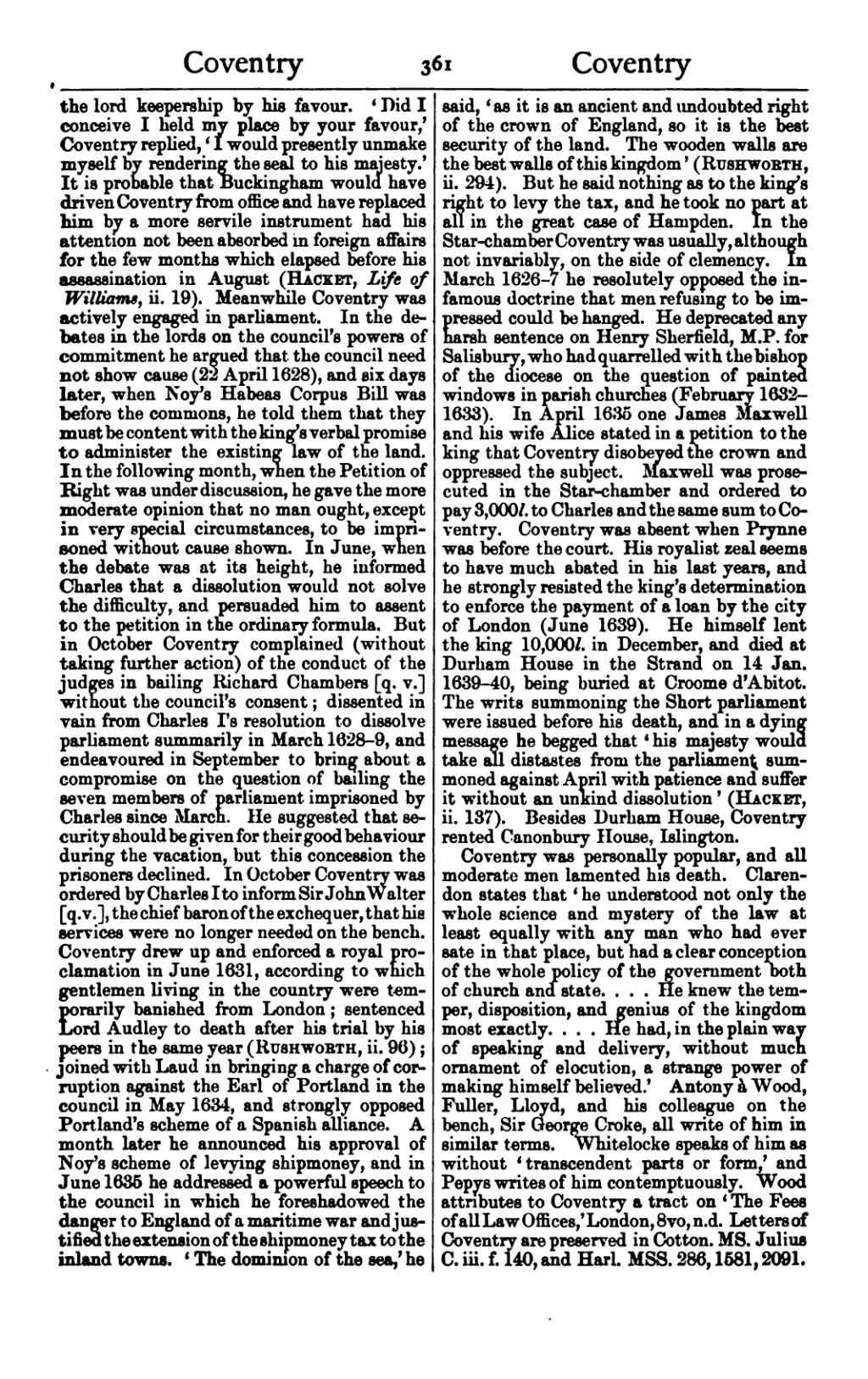the lord keepership by his favour. ‘Did I conceive I held my place by your favour,’ Coventry replied, ‘I would presently unmake myself by rendering the seal to his majesty.’ It is probable that Buckingham would have driven Coventry from office and have replaced him by a more servile instrument had his attention not been absorbed in foreign affairs for the few months which elapsed before his assassination in August (Hacket, Life of Williams, ii. 19). Meanwhile Coventry was actively engaged in parliament. In the debates in the lords on the council's powers of commitment he argued that the council need not show cause (22 April 1628), and six days later, when Noy's Habeas Corpus Bill was before the commons, he told them that they must be content with the king's verbal promise to administer the existing law of the land. In the following month, when the Petition of Right was under discussion, he gave the more moderate opinion that no man ought, except in very special circumstances, to be imprisoned without cause shown. In June, when the debate was at its height, he informed Charles that a dissolution would not solve the difficulty, and persuaded him to assent to the petition in the ordinary formula. But in October Coventry complained (without taking further action) of the conduct of the judges in bailing Richard Chambers [q. v.] without the council's consent; dissented in vain from Charles I's resolution to dissolve parliament summarily in March 1628–9, and endeavoured in September to bring about a compromise on the question of bailing the seven members of parliament imprisoned by Charles since March. He suggested that security should be given for their good behaviour during the vacation, but this concession the prisoners declined. In October Coventry was ordered by Charles I to inform Sir John Walter [q. v.], the chief baron of the exchequer, that his services were no longer needed on the bench. Coventry drew up and enforced a royal proclamation in June 1632, according to which gentlemen living in the country were temporarily banished from London; sentenced Lord Audley to death after his trial by his peers in the same year (Rushworth, ii. 96); joined with Laud in bringing a charge of corruption against the Earl of Portland in the council in May 1634, and strongly opposed Portland's scheme of a Spanish alliance. A month later he announced his approval of Noy's scheme of levying shipmoney, and in June 1635 he addressed a powerful speech to the council in which he foreshadowed the danger to England of a maritime war and justified the extension of the shipmoney tax to the inland towns. ‘The dominion of the sea,’ he said, ‘as it is an ancient and undoubted right of the crown of England, so it is the best security of the land. The wooden walls are the best walls of this kingdom’ (Rushworth, ii. 294). But he said nothing as to the king's right to levy the tax, and he took no part at all in the great case of Hampden. In the Star-chamber Coventry was usually, although not invariably, on the side of clemency. In March 1626–7 he resolutely opposed the infamous doctrine that men refusing to be impressed could be hanged. He deprecated any harsh sentence on Henry Sherfield, M.P. for Salisbury, who had quarrelled with the bishop of the diocese on the question of painted windows in parish churches (February 1632–1633). In April 1635 one James Maxwell and his wife Alice stated in a petition to the king that Coventry disobeyed the crown and oppressed the subject. Maxwell was prosecuted in the Star-chamber and ordered to pay 3,000l. to Charles and the same sum to Coventry. Coventry was absent when Prynne was before the court. His royalist zeal seems to have much abated in his last years, and he withheld support from the king's resolve to enforce the payment of a loan by the city of London (June 1639). He himself lent the king 10,000l. in December, and died at Durham House in the Strand on 14 Jan. 1639–40, being buried at Croome d'Abitot. The writs summoning the Short parliament were issued before his death, and in a dying message he begged that ‘his majesty would take all distastes from the parliament summoned against April with patience and suffer it without an unkind dissolution’ (Hacket, ii. 137). Besides Durham House, Coventry rented Canonbury House, Islington.
Coventry was personally popular, and all moderate men lamented his death. Clarendon states that ‘he understood not only the whole science and mystery of the law at least equally with any man who had ever sate in that place, but had a clear conception of the whole policy of the government both of church and state. … He knew the temper, disposition, and genius of the kingdom most exactly. … He had, in the plain way of speaking and delivery, without much ornament of elocution, a strange power of making himself believed.’ Antony à Wood, Fuller, Lloyd, and his colleague on the bench, Sir George Croke, all write of him in similar terms. Whitelocke denies him ‘transcendent parts or form,’ and Pepys reports a depreciatory estimate of him. Wood attributes to Coventry a tract on ‘The Fees of all Law Offices,’ London, 8vo, n.d. Letters of Coventry are preserved in Cotton MS. Julius C. iii. f. 140, and Harl. MSS. 286, 1581, 2091.
